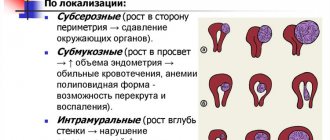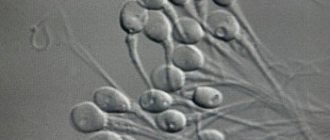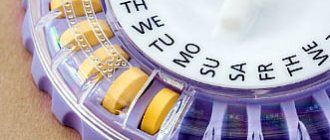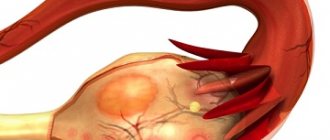04/18/2018 Category: Planning and conception Author: Alesya Shakleina
All human systems and organs participate in the life of the body. The immune system takes responsibility for protecting the body from foreign cells. However, sometimes malfunctions occur in the immune system and it begins to actively protect the body from sperm, perceiving them as foreign cells. This situation happens not only in women, but also in men and can cause infertility. What is immunological infertility and how to deal with it - we will figure it out.
- Causes of immunological infertility
- Signs of immunological childlessness
- Diagnosis of immunological infertility
Blood tests for inflammation and antibodies
- Analysis of biological material
- Partner compatibility test
- Features of therapy in men
Read more about immunological infertility
Immunological infertility is a disease in which a couple does not have diseases of the genitourinary system and cannot become pregnant. It is problematic to accurately establish the cause of the pathology.
Until recently, scientists were sure that only women could experience such infertility. This disease manifests itself in a woman in such a way that the immune cells that are supposed to be responsible for ovulation simply do not perceive the sperm of a particular man. A woman's immune system accepts sperm as a foreign object and rejects them. Therefore, fertilization of the egg does not occur.
To date, as a result of research, it has been possible to prove that a man’s immune system is capable of producing antisperm antibodies. Thus, a man’s testicles may simply not perceive female follicular fluid, and even their own biological components. This process is called autoimmunization.
When autoimmunization occurs in a man, resistance occurs in the body between its own biological materials and antibodies. Immune cells that are found in the testicles produce antibodies. Antibodies perceive biological material as a foreign object. As a result of resistance to their own antibodies, sperm simply stick together, significantly reducing the quality of sperm. A man's ability to fertilize, in this case, is also significantly reduced.
The most basic sign of immunological infertility is the absence of pregnancy with normal sperm quality in a man and normal functioning of the reproductive organs in a woman.
Why does the immune system attack sperm?
Some cells of the body never connect with immune cells, therefore, upon sudden contact, the body’s defense attacks unknown, although its own, elements. Thus, neurons in the brain and sperm in the testicles are separated from the immune system. There is a separation between the brain tissue and the blood itself, as well as the ovarian tissue. This is due to the fact that some protein structures are missing at birth, when the immune system remembers the native cells. Sperm begins to be produced only at 11-13 years of age, so the immune system will attack it. To avoid this, spermiogenesis occurs in spermatogenic tubules, which filter oxygen and necessary substances, but prevent contact with blood.
Causes
The main reason for this infertility is currently unknown. Doctors talk about heredity and individual characteristics of a person as the main cause of immunological infertility.
Features of the immune factor of infertility:
- Autoimmunization.
- Antibodies.
- Strong sensitivity of the female immune system to the sperm of a particular man. In this case, female antibodies destroy sperm, perceiving them as a foreign object.
According to statistics, such infertility occurs more often in men with diseases and injuries of the scrotal organs. For example: orchitis, dropsy, testicular injuries, varicocele, sperm stagnation or spermatic cord cyst.
Statistics among infertility factors
The degree of immunological infertility can be determined using a spermogram with a MAR test (sperm analysis). The analysis will show the ACAT titer and IgG, IgA, IgM classes. The analysis will also show the level of occurrence of the immune reaction and the location of sperm fixation. Read more about how to submit and interpret the results of this analysis in this article.
Video from the laboratory about spermogram with MAR test:
Literature
- Bozhedomov V.A., Laurent O.B., Nikolaeva M.A., Sukhikh G.T. The effect of antisperm antibodies on male reproductive function. // Andrology and genital surgery. - 2000. - No. 2. - P. 25-33.
- Mazumdar MD, Levine AS Antisperm antibodies: etiology, pathogenesis, diagnosis and treatment. // Fertil. Steril. - 1998.- V.70.- P.799-810.
- Bronson RA Antisperm antibodies: a critical evaluation and clinical guidelines. // J. Reprod. Immunol.- 1999.- V.45, No. 2.- P.159-183.
- WHO laboratory manual for the examination of human sperm and semem-cervical mucus interaction.- WHO, 4th edn.: Cambridge universiti press, 1999.- 128 p.
- Helmerhorst FM, Finken MJJ, Erwich JJ Antisperm antibodies. Detection assays for antisperm antibodies: what do they test? //Hum. Reprod.- 1999.- V.14.- P.1669-1671.
- Keel BA, Quinn P, Schmidt CF Jr., et al. Results of the American Association of Bioanalysts national proficiency testing program in andrology. //Hum. Reprod.- 2000.- V.15, No. 3.- P.680-686.
- Clinical immunology and allergology. Volume III. / Ed. L. Yeager. - M.: Medicine, 1990. — P.452-462.
- Heidenreich A., Bonfig R., Wilbert DM et al. Risk factors for antisperm antibodies in infertile men.// Am. J. Reprod. Immunol.- 1994.- V31.- P.69-76. K
- utteh WH Antisperm antibodies. Do antisperm antibodies bound to spermatozoa alter normal reproductive function? //Hum. Reprod.- 1999.- V.14, No. 10.- P.2426-2429.
- Krapez JA, Hayden CJ, Rutherford AJ, et al. Survey of the diagnosis and management of antisperm antibodies. //Hum. Reprod.- 1998.- V.13, No. 12.- P.3363-3367.
- Ombelet W., Bosmans E., Janssen M., et al. Semen parameters in a fertile versus subfertile population: a need for a change in the interpretation of semen testing. //Hum. Reprod.- 1997.- V.12.- C.987-993.
- Fletcher R., Fletcher S., Wagner E. Clinical epidemiology: foundations of evidence-based medicine. - M.: Media Sphere, 1998. - 347 p.
- Jager S., Kremer J., van Slochteren-Draaisma T. A simple method of screening for antisperm antibodies in the human male. // Int. J. Fertil.- 1978.-V.23.-P.12-21.
- Haas GG Jr, Kubota K, Quebbeman JF, et al. Circulating antisperm antibodies in recurrently aborting women.// Fertil. Steril. — 1986.- V.45.- P.209.
- Nikolaeva MA, Kulakov VI, Terekhina LM, et al. Detection of antisperm antibodies on the surface of living spermatozoa using flow cytometry: preliminary study. // Fertil. Steril. — 1993.- V.59.- P.639-644.
- Zdanov AV, Bojedomov VA, Malinina EV, et al. The new methods for detection and therapy of urogenital chlamydiosis. // International Congress “Immunology of reproduction”. - Kiev, 1996. - P.78.
- Martin-Du Pan RC, Bischof P., Campana A., Morabia A. Relationship between etiological factors and total motile sperm count in 350 infertile patients. //Arch. Androl.- 1997.- V.39, No. 3.- P.197-210.
- Bates CA Antisperm antibodies and male subfertility.// Br. J. Urol.- 1997.- V.80, No. 5.- P.691-697.
- Bozedomov VA, Nikolaeva MA, Sukhikh GT Prednizalon and proteolytic enzymes in the treatment of male autoimmune infertility. // AJRI.- 1998.- V.40, No. 4.- P.259-260.
- Bozhedomov V.A., Laurent O.B., Sukhikh G.T. Etiology and pathogenesis of male autoimmune infertility. Part 2. // Andrology and genital surgery. - 2001. - No. 1. — P.78-87.
- Korotkova I.V., Nikolaeva M.A., Bozhedomov V.A., et al. The effect of antisperm antibodies on the generation of oxygen free radicals in ejaculate samples from infertile patients. // Bulletin. let's experiment biol. and medicine. - 2001 (accepted for publication).
- D'Cruz OJ, Haas GG Jr. Lack of complement activation in the seminal plasma of men with antisperm antibodies associated in vivo on their sperm.// Am. J. Reprod. Immunol.-1990.- V.24.- P.51-57.
- D'Cruz OJ, Toth CA, Haas GG Jr. Recombinant soluble human complement receptor type 1 inhibits antisperm antibody- and neutrophil-mediated injury to human sperm.// Biol. Reprod.- 1996.- V.54, No. 6.-P.1217-1228.
- Nikolaeva MA, Golubeva EL, Kulakov VI, Sukhikh GT Ev..aluation of stimulus-induced acrosome n flow cytometric analysis. // Molec. Hum. Reprod.- 1998.- V.4, No.3.- P.243-250.
- Ohl DA, Naz RK Infertility due to antisperm antibodies.// Urology.-1995.-V.46, No. 4.- P.591-602.
- Rasanen M., Saarikoski S., Peottila I., Agrawal YP A flow cytometric study on the effect of low dose cyclic prediiisolone treatment on sperm-bound antibody levels.// Hum. Reprod.- 1994.-V.9.- P.889-893.
Tags: reproductive problems
Diagnosis and symptoms
Due to immunological infertility, from 6 to 22% of couples cannot conceive a child. If within a year of trying to get pregnant there is no result, then one of the possible causes of infertility may be precisely disorders associated with the immunity of one or two parents. It happens that with such infertility, pregnancy occurs, but the probability of miscarriage in the early stages is very high.
Table with types of infertility and their symptoms
One of the methods for identifying this disease is a postcoital test. Before taking this test, the man must have already passed his test (spermogram). If, based on the results of the spermogram, it is clear that the man is healthy, then a postcoital test is prescribed.
A woman takes it on the 14th day of the start of her menstrual cycle. Cervical fluid is taken for the test. Before taking the test, the couple must abstain from sexual intercourse for three days. The test itself is taken 10 hours after sexual intercourse, but not longer than one day (24 hours). Based on the results of the research, it will be clear whether there are sperm in the follicular mucus. If present, their activity will be determined.
Decoding the results of the postcoital test
In addition to the postcoital test, immunological infertility can be determined by additional studies, which include:
- latex agglutination method;
- mixed antiglobulin test;
- using enzyme immunoassay;
- using a penetration test.
Also, to establish a diagnosis and determine the level of ASAT (antisperm antibodies), you need to additionally donate follicular fluid and blood.
Useful and interesting video:
The effect of antibodies on the reproductive system
For quite a long time, medicine did not know exactly how antibodies affect human reproductive function and cause immunological infertility. Today scientists have proven the fact of the following phenomena:
- Antibodies inhibit active germ cells. By attaching to sperm, antibodies significantly inhibit them. Cells cannot move forward in both the male and female bodies. Antisperm antibodies stick together germ cells and paralyze them. The degree of disturbance depends on the amount of antibodies and their localization on the sperm. It is believed that when attached to the head, the sperm suffers the most.
- It is more difficult for sperm to penetrate the cervical mucus. The ability of sperm to penetrate the vaginal environment determines the chances of conception. In the presence of antibodies, the germ cell begins, as they call it in science, to “tremble in place.” This phenomenon can be seen during the Shuvarsky and Kurzrock-Miller tests. Antibodies can partially or completely block sperm from penetrating the mucus.
- Disturbances during spermatogenesis.
- Fertilization disorders. It has been proven that antibodies affect gametes. Immune cells block the penetration of sperm into the membrane of the egg. The nature of the phenomenon has not been fully studied, but the fact remains that antibodies interfere with the acrosomal reaction (overcoming the barrier of the female germ cell by the male germ cell).
- Problems with the attachment of a fertilized egg in the uterus.
- Inhibition of fetal growth and development. Antisperm antibodies affect the condition of the embryo. This is a serious problem when treated with artificial insemination methods.
Treatment of immunological infertility
Due to the difficulty of determining the exact causes of such infertility, prescribing treatment is very problematic. Treatment includes several methods: surgery, immunostimulating and androgenic drugs.
In addition to the above treatment methods, antibiotics, antihistamines and anti-inflammatory drugs are additionally prescribed. To prevent accidental conception during the period of action of potent drugs, couples must use a condom for contraception during sexual intercourse.
The course of treatment for immunological infertility ranges from six months to 8 months. As a result of treatment, the body's sensitivity to sperm antigens decreases, and the likelihood of conception increases.
Three days before ovulation, a woman is prescribed medications to increase estrogen levels. Sometimes a course of hormonal medications and corticosteroids are prescribed.
Immunological infertility can be treated using insemination (artificial introduction of sperm into the female body). IVF (in vitro fertilization) is another effective method of conceiving a child with immunological infertility. In this case, fertilization of the egg occurs in a special environment outside the female body. After fertilization, the embryo is implanted into the uterine cavity.
Prevention
Experts emphasize that immunological infertility is a consequence of various congenital and inflammatory pathologies. Sexual infections, disordered intimate life, trauma, and genital abnormalities can lead to the development of autoimmune infertility.
Prevention of immunological infertility includes:
- monogamous intimate relationships;
- timely detection and adequate treatment of defects, infections and inflammatory processes of the internal genital organs;
- correction of hormonal imbalances;
- refusal of unnecessary surgical interventions in the pelvic area.
Maintaining a healthy lifestyle is essential.
Cytotoxic cells - friends or enemies?
Another unfavorable factor for pregnancy is an increase in the content of activated cytotoxic cells (lymphocytes) in a woman’s blood serum. Normally, they are always present in the peripheral blood and protect the body from foreign, mutating or virus-infected cells. Since the fetus is half foreign to the mother's immune system, cytotoxic cells recognize foreign antigens and are able to damage the trophoblast, which leads to placentation disorders and fetal loss. In order to reduce the increased number of cytotoxic cells, it is recommended to use immunoglobulin therapy, which binds to receptors on cells and thus prevents their negative effects.
Brief summary
Many couples try to treat immunological infertility using traditional medicine methods and recipes. Be sure to consult a doctor; do not self-medicate.
If a married couple is unable to conceive a child within a year, this is a serious problem, perhaps it is immunological infertility. To achieve the birth of a child, you should not let the situation take its course, you must consult a doctor.
Don't forget to write comments and rate the article with stars. Thank you for visiting the site, we hope we were able to help you.
Therapy in men
Treatment of male autoimmune factor is etiological, aimed at eliminating the root cause.
This may include antibacterial treatment of inflammation, restoration of the integrity of the seminal ducts and local circulation through surgery, and prevention of further injury or infection of the appendages.
The use of glucocorticosteroids (for example, Prednisolone) is also effective to reduce the synthesis of AST in the genitals.
Physiotherapy will help eliminate antibodies from the surface of healthy sperm.
Auxiliary general strengthening measures include vitamin therapy and other methods of activating spermatogenesis.
Application of reproductive technologies
In addition to traditional methods, reproductive specialists recommend using ART: IVF, ICSI, IUI.
So, if a woman has no problems with embryo implantation, and the reason for childlessness is the low quality of her husband’s sperm, AsAt in the ejaculate, IVF + ICSI gives a good result. The sperm is filtered and the best healthy sperm is selected and used to fertilize the egg in vitro. The embryo is then implanted directly into the uterus. At the same time, contact of male germ cells with the aggressive environment of the vagina and cervical mucus is excluded.
IUI, intrauterine insemination, unlike in vitro insemination, involves the introduction of ejaculate directly into the uterus, which also makes it possible to first improve the quality of sperm and avoid its passage through the cervical canal.
ART technologies have one drawback - they are expensive, but do not provide a 100% guarantee.
Folk remedies
Traditional medicine methods can be used in complex infertility therapy to increase fertility, but as an independent method they are ineffective in this case.
Drink sage, knotweed, plantain seeds, linden, aloe, adonis, hogweed or red brush, bee products, if there are concomitant diseases for which these herbs are indicated. Consult your doctor first, because not all plants are compatible with medications. You can take mixtures, decoctions, tinctures orally or use herbal medicine for local douching, lotions, and making vaginal and rectal suppositories.
Men are advised to eat a protein and vitamin diet to improve sperm quality.
If you follow the recommendations of doctors, the immunological type of infertility is usually completely curable.
Treatment differs for women and men, as it has its own characteristics
Immunological infertility in women: treatment
To eliminate the causes of infertility, antihistamines with high doses of antibacterial drugs are prescribed, which improves immunity.
Injecting heparin under the skin and using aspirin help fight autoimmune processes.
During treatment, it is important to protect yourself during sexual intercourse for six to eight months (depending on the prescribed course). Since complete fertilization of the egg is impossible with reduced immunity.
To stabilize the protective systems of a woman’s body, the introduction of a mixed group of proteins before conception or the use of lymphocytes from a donor is indicated.
Approaching motherhood
Studies have shown that the AIL method has a pronounced immunocorrective effect and increases the effectiveness of infertility treatment both in the natural cycle and during in vitro fertilization. During the period of AIL, no serious complications were reported in the mother or child in any center.
According to our data, when the normative values of the immunogram are reached (high proliferative response of cells, sufficient production of blocking factors, absence of a high content of cytotoxic cells), pregnancy occurs significantly more often.
During the period of work in the laboratory, more than 5,000 married couples were examined and half of them were treated according to the proposed method. As a result, pregnancy occurred in 46% of couples in the natural cycle and in 51% of couples with 2 or more unsuccessful IVF attempts in history. Thus, immunological infertility is not a reason for despair, but only a long path to motherhood.











